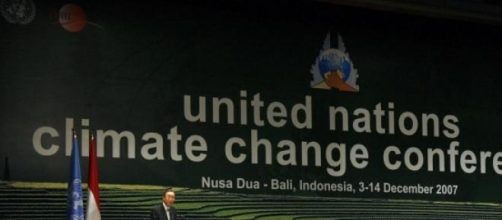For the last 20 or so years each Conference of Parties on Climate Change (CoP) has been heralded as a new opportunity. Hope builds as the prospect of that new breakthrough solution being presented to set us off on a new path towards curbing our excessive consumptioon of fossil fuels. For the last 20 or so years we have been continually disappointed.
The outlook this time round was somewhat more optimistic. In the run up to the meeting in Lima a carbon deal was struck between the world´s two dirtiest economies; the US and China, This deal was heralded as being ´historic´and representing an important ´milestone´in creating agreement on an environmental issue.
The pact has committed the US to reducing its emmissions by 26-28% by 2025 and China has pledged to reduce its own by 20% by 2030. This does of course represent a step forward, but the pledges are relatively weak - the EU for instance has set itself the target of reaching atleast a 40% cut by 2030.
A sense of momentum was brought to the talks by this deal. In the first few days a further commitment was made. The Climate Fund, a source of much controversy, was to be topped up to aid developing countries in the fight against climate change. Further donations brought the overall fund to around $10billion, the expected target. Again there was much self-congratulation and backslapping due to this ´landmark achievement´in the words of the executive director of the fund.
In the starved world of environmental politics feeding of the scraps thrown from the table is not unusual and on top of this we are constantly reminded what a feast it is that is being provided. Compare this poultry figure to military spending for instance, it is generally estimated that the US alone spends around $600 billion on its military. Given the obviously low level importance that the climate issue is given by developed nations the next challenge of raising the Fund to $100billion by 2020 dosn´t look particularly hopeful. Despite all efforts to raise the environmental issue higher up the political agenda we are only seeing peacemeal responses and continual rhetoric.
It is this issue that has proven so difficult to overcome.
Developed countries generally believe that the cuts in emissions should be shared across the board, regardless of developing or developed status perhaps as an effort to safeguard their dominant economic status for some years to come. Developing countries however, are demanding that the costs of meeting the climate challenge should be provided in part by the wealthier nations of the world. A sort of global socialist model. Of course at this point of division an impasse is reached.
The method to overcome the divisions at the CoP in Lima was a multiple choice document where delegates were provided with a choice of three options on each article. The result? As reported by the Guardian, by the beginning of the final day only one article had been agreed upon - a pledge to enhance engagement in the run up to 2020.
In essence a pledge to try harder next time.
The issue of finance is a perpetual problem when it comes to environmental policy. Whenever a developing country demands money from the west to solve a problem extortion and corruption is screamed. Take the example of Ecuador and the Yasuni National Park. When President Rafael Correa asked the global community to provide funds ($3.6 billion) to protect a large swathe of rainforest - what was the almost unanimous response? A large no.
We should no longer be surprised by these results when the invested interests of fossil fuel companies are ever present in the decision making process of Government officials. It hampers the process severly. Developing countries do require assistance in the climate fight.
It is a matter of global fairness and equality. That should be clearly evident to all, some of these states face potential disastrous consquences if the worst case scenarios occur.
So what is the forecast for the next climate meeting in 2015? More than likely more of the same. But this time perhaps the delegates should arrange an internet conference. Atleast in that way they can cut down the massive carbon footprint that the CoP meetings inevitably incur, maybe then we can say a little progress has been made.

